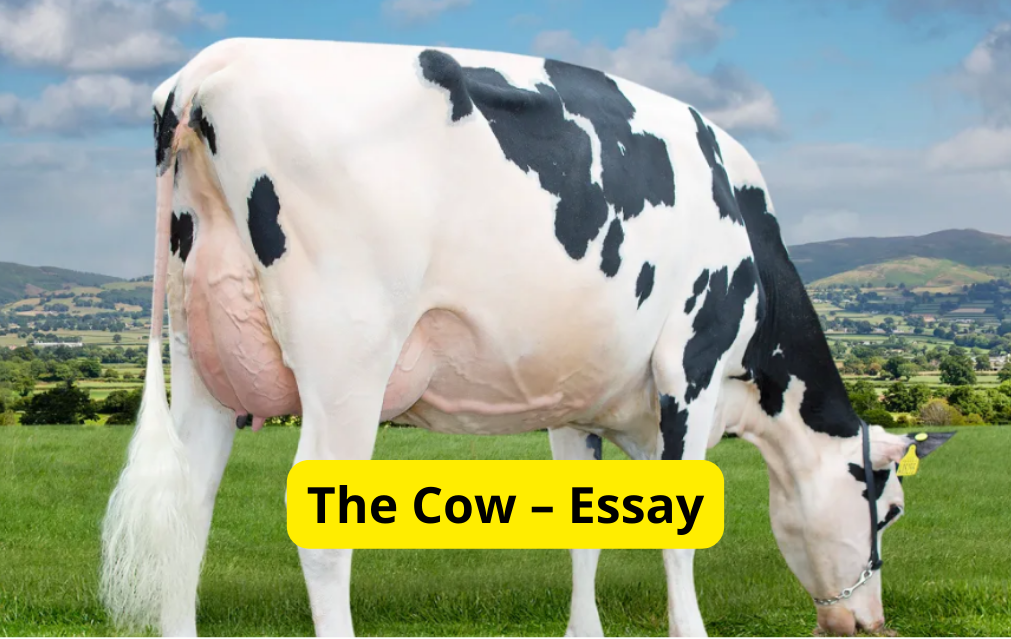The Cow – Essay
Emblem of Agriculture and a Keystone of Society – The cow, a domesticated ungulate revered across cultures and continents, stands as a testament to humanity’s agricultural prowess and symbiotic relationship with nature. This essay delves into the multifaceted role of cows in agriculture, their contributions to human society, and the ethical considerations surrounding their welfare.
Historical and Cultural Significance – Cows have been integral to human societies for thousands of years, with evidence of their domestication dating back to approximately 10,000 years ago in regions of modern-day Turkey and the Indus Valley. These animals have not only provided essential resources such as milk, meat, and leather but have also held significant cultural and religious roles in various societies. In Hinduism, for instance, the cow is revered as a symbol of life and sustenance, embodying ahimsa or non-violence. Similarly, ancient Egyptian and Greek civilizations incorporated bovines in their mythology and religious practices, highlighting the cow’s universal significance.
Agricultural and Economic Contributions – Cows play a pivotal role in agriculture and the economy. They are primarily valued for their ability to produce milk, an essential dietary staple rich in nutrients like calcium, protein, and vitamin D. The dairy industry relies heavily on cows for products such as cheese, butter, and yogurt, which are central to many diets worldwide. Beyond dairy, beef from cows is a major source of protein for millions, contributing to the food security and culinary traditions of countless communities. The role of cows extends beyond food production. They contribute to the agricultural cycle as natural tillers of the soil and through their manure, which is a valuable natural fertilizer enhancing soil health and crop yields. Moreover, cowhide is used in the leather industry, producing goods ranging from shoes and belts to furniture, showcasing the versatility of cow-derived products.
Environmental Impact and Ethical Considerations – The global population of cows and their necessity in human diets and economies bring forth significant environmental and ethical challenges. Cattle farming is a major source of methane, a potent greenhouse gas, contributing to climate change. Additionally, the land and water resources required for cattle rearing are immense, raising concerns over sustainability and environmental degradation. Ethically, the welfare of cows in industrial farming practices has become a point of contention. The push for higher yields and efficiency often leads to compromised animal welfare, prompting debates on the ethics of factory farming, animal rights, and the necessity of adopting more humane and sustainable farming practices
Looking Forward: Sustainable Practices and Alternatives – Addressing the environmental and ethical concerns associated with cow farming, there is a growing movement towards sustainable agricultural practices. These include integrated livestock management, organic farming, and regenerative agriculture techniques that aim to reduce environmental impact, improve animal welfare, and ensure long-term ecological balance. Furthermore, the development of plant-based alternatives and lab-grown meats presents opportunities to alleviate some of the pressures on cow populations and the environment. These innovations, coupled with a shift towards more sustainable consumption patterns, could help balance humanity’s needs with those of the planet and its other inhabitants.
Conclusion – Cows, beyond their role as a source of milk, meat, and leather, symbolize the deep interconnection between humans and nature. They have shaped societies, economies, and cultures throughout history. As we move forward, it is crucial to address the challenges associated with cow farming through sustainable practices, ethical treatment, and innovative alternatives, ensuring that cows continue to be an emblem of agricultural prosperity and a keystone of society in a way that respects both the animals and the environment.
More:


[…] The Cow – Essay […]
[…] The Cow – Essay […]
[…] The Cow – Essay […]
[…] The Cow – Essay […]
[…] The Cow – Essay […]